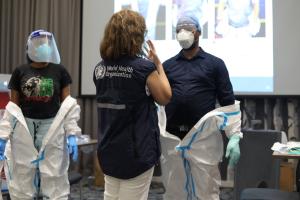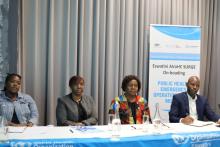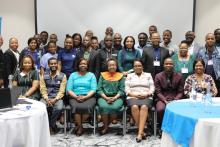25 Emaswati complete phase 1 of the African Health Volunteers Corps training
Following the recommendations of the Joint External Evaluation (JEE) conducted by the World Health Organization (WHO) in 2018 in the Kingdom of Eswatini, 25 technical officers have been trained to respond to emergencies, contributing to a pool of over 3000 emergency responders to be trained in the African region. Included in the training were five participants from Boitekanelo College in Botswana, an institution that will carry out step-down training on the basics of public health emergency management in the country. The JEE conducted by global and local experts revealed that Eswatini had no capacity in 20 of the 48 indicators assessed. Limited capacity was recorded in 19 indicators. To address some of the gaps identified in the JEE, capacity building of front-line healthcare workers on public health emergency management was identified as the key intervention for the country
Based on lessons learnt from the COVID-19 pandemic, WHO AFRO in collaboration with Africa CDC has launched an Emergency Preparedness and Response Flagship initiative. This initiative has three components - Promoting Resilience of Systems for Emergencies (PROSE) which focuses on preparedness, Transforming African Surveillance Systems (TASS) which focuses on detection and Strengthening and Utilizing Response Groups for Emergencies (SURGE) which focuses on response. In a bid to strengthen capacity for crisis preparedness and response in the African continent, WHO is collaborating with member states to strengthen the response infrastructure. Africa is leading the way in protecting the world from pandemics and progress has been made in ensuring health security is strengthened through proven public health interventions. This includes reducing the number and duration of outbreaks as well as building capacity through the AVoHC SURGE training. The SURGE initiative aims at training 3000 African responders (at least 50 per country) who can be deployed within 24 to 48 hours of the occurrence of an emergency.
In Eswatini, the training was conducted between October and November 2023. A total of 26 participants from various sectors and disciplines were trained to qualify them for the roster of African Health Volunteers Corps (AVoHC) SURGE emergency responders with desired qualities ready to deploy, to detect and respond to emergencies. The purpose of the training was to strengthen the skills and core capacities of the AVoHC-SURGE members in public health emergency management to effectively manage emergencies with public health impact, using an all-hazards approach. This training was facilitated by technical officers from the Public Health EOC Network in the African region, WHO Regional Officer for Africa, and WHO country office. The training is organized in two phases, the first one being the on-boarding phase which has 4 modules, while phase two comprises specialized training specific to the disciplines. The team has already covered two of the phase 1 modules of this training and the other two will be covered in 2024. Topics covered during the training include the introduction to WHO emergency response framework, risk assessment and grading, emergency management planning, emergency management legal framework, policies, plans and procedures, external communication, procurement, and infection, prevention and control (IPC). The training utilized participative methodologies combining presentations with group work and practical sessions.
The training was officially opened by Director of Health Services Dr. Velephi Okello and closed by the Ministry of Health CDC COAG Chief of Party Dr Gcinile Buthelezi. Speaking during the closing ceremony of the training, Dr Buthelezi commended the World Bank and WHO for the technical and financial support towards the training. She urged WHO to prioritize the country for the last two modules remaining for the country’s team to graduate phase 1.
Speaking at the same event, World Bank technical officer Tengetile Tsabedze reiterated that the grant from the World Bank is for ensuring that Eswatini is better prepared for the next pandemic than it was during COVID-19. “The World Bank has confidence in the team and the Ministry of Health has done a commendable job in learning from COVID-19 as well as kickstarting the process to prepare for the next pandemic,” she said.
WHO Representative Dr. Susan Tembo added that building the capacity of member states to adequately prevent, prepare for, detect, and rapidly respond to health emergencies is more critical now than ever. “This is even more so in the African region where over a hundred emergencies occur each year adding to the strain brought by the three years of COVID-19 on public health systems and society at large,” she said adding that WHO will continue to facilitate capacity building activities to enhance public health emergency preparedness and response.
The National Disaster Management Agency (NDMA) Acting Chief Executive Officer Mr. Victor Mahlalela encouraged the participants to uplift the spirit of the country when it comes to preparedness. He added that NDMA will support all initiatives to address the issues highlighted in the JEE report. “We understand the International Health Regulation (IHR) and we will help the Ministry of Health in all initiatives that are aimed at increasing capacity for emergency response. We will support all the initiatives that are focusing on preparedness, and make sure that we are ready as a country for any pandemic that we may experience,” he said.
WHO Communications Officer
Email: mavusow [at] who.int
Tel: +26878020180
WhatsApp: +26876509256
Shirley Amimo
Work cell: +26876195916
World Health Organization Eswatini
2nd Floor, UN building Somhlolo Road, Mbabane.


